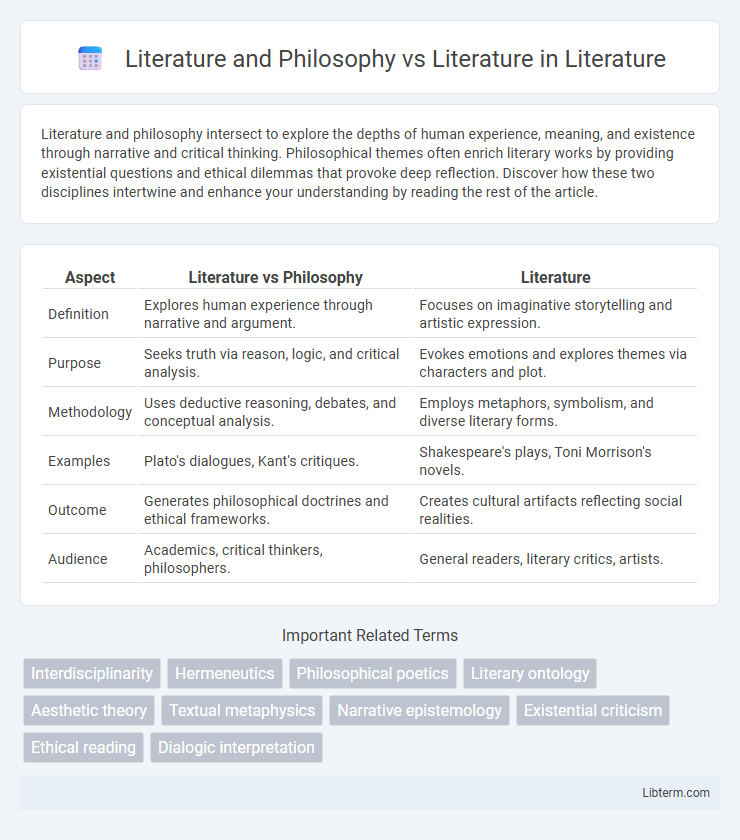Literature and philosophy intersect to explore the depths of human experience, meaning, and existence through narrative and critical thinking. Philosophical themes often enrich literary works by providing existential questions and ethical dilemmas that provoke deep reflection. Discover how these two disciplines intertwine and enhance your understanding by reading the rest of the article.
Table of Comparison
| Aspect | Literature vs Philosophy | Literature |
|---|---|---|
| Definition | Explores human experience through narrative and argument. | Focuses on imaginative storytelling and artistic expression. |
| Purpose | Seeks truth via reason, logic, and critical analysis. | Evokes emotions and explores themes via characters and plot. |
| Methodology | Uses deductive reasoning, debates, and conceptual analysis. | Employs metaphors, symbolism, and diverse literary forms. |
| Examples | Plato's dialogues, Kant's critiques. | Shakespeare's plays, Toni Morrison's novels. |
| Outcome | Generates philosophical doctrines and ethical frameworks. | Creates cultural artifacts reflecting social realities. |
| Audience | Academics, critical thinkers, philosophers. | General readers, literary critics, artists. |
Defining Literature: Scope and Essence
Defining literature involves recognizing its broad scope encompassing diverse genres, cultural narratives, and artistic expressions that reflect human experience and societal values. Philosophy intersects with literature by probing the essence of existence, ethics, and knowledge through critical analysis and interpretive frameworks, enhancing the understanding of literary texts. While literature captivates through storytelling and creative expression, philosophy deepens its meaning by questioning underlying truths and conceptual foundations.
Philosophy’s Role in Literary Analysis
Philosophy plays a crucial role in literary analysis by providing critical frameworks such as existentialism, phenomenology, and post-structuralism that deepen the understanding of texts. Philosophical concepts enable the exploration of themes like identity, morality, and reality within literature, enriching interpretations and revealing complex layers of meaning. The integration of philosophical thought transforms literary criticism from mere storytelling into a profound inquiry into human existence and knowledge.
Literature as an Autonomous Discipline
Literature as an autonomous discipline emphasizes the intrinsic value of texts, analyzing narrative structure, thematic elements, and linguistic artistry without relying on external philosophical frameworks. This approach prioritizes close reading and critical theory rooted within literary studies, distinguishing it from interdisciplinary methods that blend philosophical concepts. By focusing solely on literature's unique forms and aesthetic qualities, scholars uphold its independence as a field dedicated to exploring human experience through storytelling and language.
Intersections between Literature and Philosophy
Literature and philosophy intersect through their exploration of human experience, ethics, and existential questions, with literary texts often serving as a medium for philosophical inquiry and reflection. Philosophical themes such as identity, morality, and reality are deeply embedded in literary narratives, allowing readers to engage with complex ideas through storytelling and metaphor. This interdisciplinary relationship enhances critical thinking and enriches both fields by merging analytical rigor with creative expression.
Philosophical Themes within Literary Works
Philosophical themes within literary works explore fundamental questions about existence, ethics, and human nature through narrative and character development, enriching the depth of literature beyond mere storytelling. Literature and philosophy intersect when texts engage with concepts such as consciousness, morality, and truth, inviting readers to reflect on abstract ideas within concrete contexts. This fusion enhances literary analysis by incorporating philosophical inquiry, revealing how literature serves as a medium for existential exploration and critical thought.
Comparative Approaches: Literature and Philosophy
Comparative approaches between literature and philosophy explore how narrative techniques and thematic structures in literature intersect with philosophical inquiries into existence, ethics, and knowledge. Distinctions arise from literature's emphasis on imaginative storytelling and aesthetic expression, contrasted with philosophy's analytical rigor and argumentative clarity. Interdisciplinary studies reveal mutual enrichment when literary texts are examined through philosophical frameworks, enhancing interpretation and critical thinking.
Methodologies: Philosophical Criticism vs Literary Criticism
Philosophical criticism employs analytical methodologies centered on logic, ethics, and metaphysical inquiry to interpret texts, emphasizing universal truths and existential themes. Literary criticism focuses on narrative techniques, stylistic elements, and cultural contexts, utilizing frameworks like structuralism, post-colonialism, and psychoanalysis to explore meaning and reader response. Both methodologies enrich understanding, with philosophical criticism addressing abstract concepts and literary criticism analyzing form, language, and societal influence within literature.
Impact of Philosophy on Literary Theory
Philosophy profoundly shapes literary theory by providing critical frameworks such as structuralism, post-structuralism, and existentialism that influence textual interpretation and analysis. Philosophical concepts from thinkers like Derrida, Foucault, and Sartre challenge traditional narrative structures and encourage exploration of meaning, identity, and power within literature. This intercultural synergy expands the scope of literary criticism beyond aesthetic appreciation to include ethical, epistemological, and ideological dimensions.
Exploring Ethical Questions through Literature
Exploring ethical questions through literature involves analyzing complex moral dilemmas, character motivations, and societal values embedded in texts, which philosophy alone often addresses through abstract reasoning. Literature offers nuanced narratives that humanize ethical theories, making philosophical concepts tangible and emotionally resonant. Studying both literature and philosophy together enriches understanding by bridging theoretical ethics with lived human experience portrayed in fictional and non-fictional works.
Literature’s Unique Contribution to Human Understanding
Literature uniquely captures the complexities of human emotion and experience through narrative, metaphor, and character development, offering insights into the human condition that abstract philosophical discourse often cannot convey. Unlike philosophy, which primarily seeks universal truths through logical argumentation, literature immerses readers in diverse cultural contexts and individual perspectives, enriching empathy and emotional intelligence. This embodied exploration fosters a deeper understanding of subjective realities, making literature indispensable for comprehending the nuances of human existence.
Literature and Philosophy Infographic

 libterm.com
libterm.com